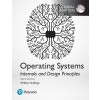Online Chapters and Appendices
VideoNotes
Preface
About the Author
I. Background
1. Computer System Overview
1.1. Basic Elements
1.2. Evolution of the Microprocessor
1.3. Instruction Execution
1.4. Interrupts
1.5. The Memory Hierarchy
1.6. Cache Memory
1.7. Direct Memory Access
1.8. Multiprocessor and Multicore Organization
1.9. Key Terms, Review Questions, and Problems
1A. Performance Characteristics of Two-Level Memories
2. Operating System Overview
2.1. Operating System Objectives and Functions
2.2. The Evolution of Operating Systems
2.3. Major Achievements
2.4. Developments Leading to Modern Operating Systems
2.5. Fault Tolerance
2.6. Os Design Considerations for Multiprocessor and Multicore
2.7. Microsoft Windows Overview
2.8. Traditional Unix Systems
2.9. Modern Unix Systems
2.10. Linux
2.11. Android
2.12. Key Terms, Review Questions, and Problems
II. Processes
3. Process Description and Control
3.1. What is a Process?
3.2. Process States
3.3. Process Description
3.4. Process Control
3.5. Execution of the Operating System
3.6. Unix Svr4 Process Management
3.7. Summary
3.8. Key Terms, Review Questions, and Problems
4. Threads
4.1. Processes and Threads
4.2. Types of Threads
4.3. Multicore and Multithreading
4.4. Windows Process and Thread Management
4.5. Solaris Thread and Smp Management
4.6. Linux Process and Thread Management
4.7. Android Process and Thread Management
4.8. Mac OS X Grand Central Dispatch
4.9. Summary
4.10. Key Terms, Review Questions, and Problems
5. Concurrency: Mutual Exclusion and Synchronization
5.1. Mutual Exclusion: Software Approaches
5.2. Principles of Concurrency
5.3. Mutual Exclusion: Hardware Support
5.4. Semaphores
5.5. Monitors
5.6. Message Passing
5.7. Readers/Writers Problem
5.8. Summary
5.9. Key Terms, Review Questions, and Problems
6. Concurrency: Deadlock and Starvation
6.1. Principles of Deadlock
6.2. Deadlock Prevention
6.3. Deadlock Avoidance
6.4. Deadlock Detection
6.5. An Integrated Deadlock Strategy
6.6. Dining Philosophers Problem
6.7. Unix Concurrency Mechanisms
6.8. Linux Kernel Concurrency Mechanisms
6.9. Solaris Thread Synchronization Primitives
6.10. Windows Concurrency Mechanisms
6.11. Android Interprocess Communication
6.12. Summary
6.13. Key Terms, Review Questions, and Problems
III. Memory
7. Memory Management
7.1. Memory Management Requirements
7.2. Memory Partitioning
7.3. Paging
7.4. Segmentation
7.5. Summary
7.6. Key Terms, Review Questions, and Problems
7A. Loading and Linking
8. Virtual Memory
8.1. Hardware and Control Structures
8.2. Operating System Software
8.3. Unix and Solaris Memory Management
8.4. Linux Memory Management
8.5. Windows Memory Management
8.6. Android Memory Management
8.7. Summary
8.8. Key Terms, Review Questions, and Problems
IV. Scheduling
9. Uniprocessor Scheduling
9.1. Types of Processor Scheduling
9.2. Scheduling Algorithms
9.3. Traditional Unix Scheduling
9.4. Summary
9.5. Key Terms, Review Questions, and Problems
10. Multiprocessor, Multicore, and Real-Time Scheduling
10.1. Multiprocessor and Multicore Scheduling
10.2. Real-Time Scheduling
10.3. Linux Scheduling
10.4. Unix Svr4 Scheduling
10.5. Unix Freebsd Scheduling
10.6. Windows Scheduling
10.7. Summary
10.8. Key Terms, Review Questions, and Problems
V. Input/Output and Files
11. I/O Management and Disk Scheduling
11.1. I/O Devices
11.2. Organization of the I/O Function
11.3. Operating System Design Issues
11.4. I/O Buffering
11.5. Disk Scheduling
11.6. Raid
11.7. Disk Cache
11.8. Unix Svr4 I/O
11.9. Linux I/O
11.10. Windows I/O
11.11. Summary
11.12. Key Terms, Review Questions, and Problems
12. File Management
12.1. Overview
12.2. File Organization and Access
12.3. B-Trees
12.4. File Directories
12.5. File Sharing
12.6. Record Blocking
12.7. Secondary Storage Management
12.8. Unix File Management
12.9. Linux Virtual File System
12.10. Windows File System
12.11. Android File Management
12.12. Summary
12.13. Key Terms, Review Questions, and Problems
VI. Embedded Systems
13 Embedded Operating Systems
13.1. Embedded Systems
13.2. Characteristics of Embedded Operating Systems
13.3. Embedded Linux
13.4. Tinyos
13.5. Key Terms, Review Questions, and Problems
14. Virtual Machines
14.1. Virtual Machine Concepts
14.2. Hypervisors
14.3. Container Virtualization
14.4. Processor Issues
14.5. Memory Management
14.6. I/O Management
14.7. Vmware Esxi
14.8. Microsoft Hyper-V and Xen Variants
14.9. Java Vm
14.10. Linux Vserver Virtual Machine Architecture
14.11. Summary
14.12. Key Terms, Review Questions, and Problems
15. Operating System Security
15.1. Intruders and Malicious Software
15.2. Buffer Overflow
15.3. Access Control
15.4. Unix Access Control
15.5. Operating Systems Hardening
15.6. Security Maintenance
15.7. Windows Security
15.8. Summary
15.9. Key Terms, Review Questions, and Problems
16. Cloud and IoT Operating Systems
16.1. Cloud Computing
16.2. Cloud Operating Systems
16.3. The Internet of Things
16.4. IoT Operating Systems
16.5. Key Terms and Review Questions
Appendix A. Topics in Concurrency
Appendix B. Programming and Operating System Projects
References
Credits
Index

